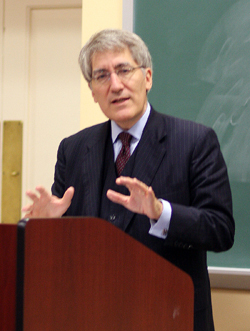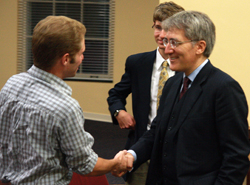Robert P. George, Princeton University professor and noted conservative Christian thinker was welcomed to Wabash last night by the Wabash Conservative Union, the Wabash Newman Center, and the Intercollegiate Studies Institute for his lecture "Natural Law, God, and Human Dignity."
 George described his views regarding Natural Law’s human application extensively. But behind his rather daunting title was really an analysis of the bevy of interpretations available for it. Rather than defining Natural Law through a god or through human dignity, George related the two subjective outlooks back to Natural Law.
George described his views regarding Natural Law’s human application extensively. But behind his rather daunting title was really an analysis of the bevy of interpretations available for it. Rather than defining Natural Law through a god or through human dignity, George related the two subjective outlooks back to Natural Law.
First establishing the intrinsic value of pursuits such as friendship and artistic beauty, which do not hold instrumental value on their own, he showed that basic human rights were too intrinsically valuable. Through this argument, theists and atheists alike can agree on that fundamental “goods” for humans exist.
Staying clear of political arguments altogether, George argued that human rights are defensible so long as the individual is regarded as an end, not a means. The Kantian idea that social systems exist as a means to support individual human ends was the backbone of his argument. God and dignity are only involved to decide exactly where a line is drawn, such as the point a fetus becomes “human enough” to gain its rights.
Another seemingly religious topic George analyzed was original sin. Biblically centered or not, original sin is the basic imperfection that prevents a standard set of values from emerging amongst humanity. So from this handicap, George argues, the goal is to strive towards the intrinsically positive values we know exist.
Among other natural positives, George also listed knowledge and health. Both of which, he said, can be improved only for the point of improvement without provoking questioning. He compared these to money, an intrinsically worthless substance with enormous instrumental value. Stating that “one single ‘human good’ is not practical,” he once again emphasized human beings as an end rather than a means of the social systems we create.
By relating each of his subjects to a human “goodness” rather than a religious standpoint, his statements remained logically based regardless of the audience’s views. George listed a number of his atheistic colleagues (including at one point Richard Dawkins) with whom he had discussed these topics. It was this open attitude that seemed to most impress those listening.
 Zachary Rohrbach ’12 said George “kept his points framed in a light that was applicable to both theism and atheism.” Throughout his lecture, George made a point of arguing all sides of a view, starting with his own Christian outlook and proving the same application of both reductive materialist and spiritual atheists.
Zachary Rohrbach ’12 said George “kept his points framed in a light that was applicable to both theism and atheism.” Throughout his lecture, George made a point of arguing all sides of a view, starting with his own Christian outlook and proving the same application of both reductive materialist and spiritual atheists.
To accommodate those viewpoints, George relied heavily on his knowledge of the works of thinkers like Aristotle and Aquinas. Ted Plumber ’13 said the references “mandated a more philosophical background in order to grasp them.”
To conclude his lecture, George brought his ideas full circle to establish that “all of our choices and actions determine not only the world we create, but they constitute our intransitive, internal beings.” The way we support an action politically also adds to the intrinsic goodness of our inner selves, and to promote equal Natural Law is to improve ourselves for our own dignified sake, religious or not.